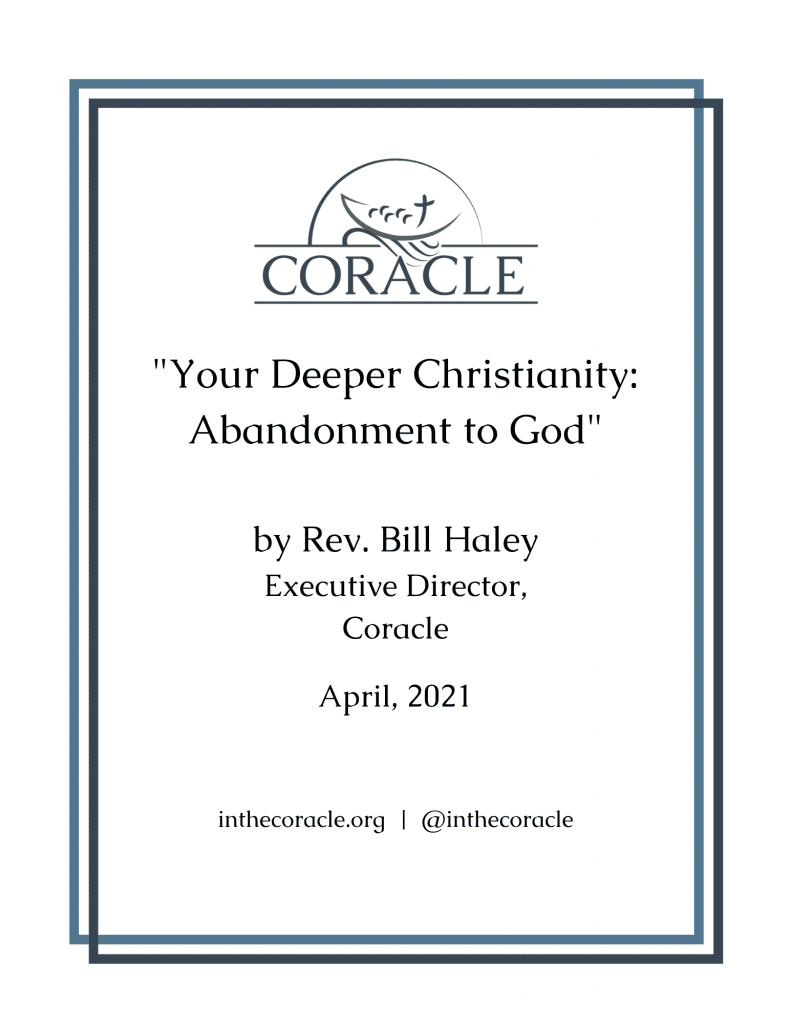
“The great aim of the Holy Spirit is to get us abandoned to God.”
-Oswald Chambers
“The essence of spirituality is contained in this phrase: complete and utter abandonment to the will of God.”
-Jean Pierre de Caussade
These are bold statements from trusted disciples, coming from both the Protestant and Catholic traditions and essentially saying the same thing: abandonment to God is the core and goal of Christian spirituality and of the Holy Spirit’s work in us. Abandonment to God is the deep stuff for a Christian. It’s where life with Jesus leads for those who truly love and trust him.
Abandonment to God is when we–in the marrow of our bones–trust the goodness and providence of God and surrender ourselves completely to His good and perfect will, come what may– in whatever form his will takes, in all circumstances. We might not like our circumstances, nor would we ever choose them, but we trust God in them and seek to encounter and serve him in all things, perhaps particularly the tougher experiences of life.
That’s a long way to get at a definition; here’s the short one:
Abandonment to God is to want only the will of God, regardless of the form it takes.
This is Jesus praying in the Garden of Gethsemane three times, “Not my will but yours be done” (Lk 22:42), and while being tortured “continued entrusting himself” to God (1Pt 2:23), and whose last act was one of trust, “Into your hands I commend my spirit” (Lk 23:46).
This is Paul who was able to find contentment in all circumstances and rejoice in all of them (Phil 4:11-13, 4-6), who wanted to be with God in heaven yet contentedly stayed on earth because that was God’s will for him (Phil 1:21), who knew that even the harshest experiences of life wouldn’t separate him from God’s love. (Rom 8:39)
This is Job: “Yet though he slay me, still will I trust in him” (Job 13:15)
Peter struggled to understand this, so Jesus pointed the way. When Peter complains that his path might be harder than John’s, Jesus replies, “What is that to you? You follow me.” (Jn 21:22)
It’s not just Bible characters who teach and model abandonment to God. It was this posture of abandonment to God that got my dear brother Robert Mackay through and beyond the hardest experience of his life. Robert shows us that we can learn this.
Over several decades, my soul has been deeply stirred by encountering strange, unlooked-for prayers and stories of submission, affection, and naked trust. The first was from Charles de Foucauld, willingly martyred in Algeria in 1916:
Father,
I abandon myself into your hands;
do with me what you will.
Whatever you may do, I thank you:
I am ready for all, I accept all.Let only your will be done in me,
and in all your creatures –
I wish no more than this, O Lord.Into your hands I commend my soul:
I offer it to you with all the love of my heart,
for I love you, Lord, and so need to give myself,
to surrender myself into your hands without reserve,
and with boundless confidence,
for you are my Father.
What I appreciate about this prayer is its simplicity, its humility, its faith, and its willingness to give oneself entirely to God and endure whatever for God’s sake and for the purposes of God. What really captures me is the last line, ‘for you are my Father.’ This ‘abandoning oneself to God’ is based on the recognition that God is our loving and good Father who we can trust, a necessary foundation for this level of faith.
Another prayer like this written some 350 years earlier has a similar tone of offering motivated by affection and is given to us by St. Ignatius of Loyola:
“Take, O Lord, and receive my entire liberty, my memory, my understanding and my whole will. All that I am and all that I possess You have given me: I surrender it all to You to be disposed of according to Your will. Give me only Your love and Your grace; with these I will be rich enough, and will desire nothing more.”
Against the backdrop of all the joys and sorrows of life, Francois Fenelon prayed to God,
“We adore all your purposes though we know them not. We offer and yield ourselves wholly to you; and would have no other desire but the accomplishment of your will.”
Having read and repeated these prayers over the years, some time ago I had occasion to submit my life to God in a new way, to offer my whole self and life freely to God’s service, and wrote my own (first) prayer of abandonment:
“Father, I have been loved by You, and You know me, and you are with me. You are good, and You know what is best for me. You know best how to use me. You know best how to shape me. You know what I need, and You are good. I give you all of myself, all that I am, all that I have, all of it I give to You, and gladly. My life is not my own. I give back to you all that is in me that is good, and I give you all my weakness, all my sin, everything in me that remains broken. I give it all to you to take it, remake it, and use it as you see fit. For you know me, and you love me. And I love you too. I abandon myself to you, dear Father, with hope and gladness. Stay with me. Amen.”
These are the prayers, here’s one of the stories. Shahbaz Bhatti was in the early 2000s a Christian in Pakistan, unusually placed in a high position of government as the Federal Minister for Minorities Affairs in the predominantly Muslim country. It was a dangerous job, one that carried an almost inevitable outcome. And indeed, Shahbaz was assassinated in 2011. Three years earlier he’d said in an interview,
“I do not feel any fear in this country. Many times the extremists wanted to kill me, many times they wanted to put me in prison, they threatened me, they harassed me and they terrorized my family. [I told my father], ‘Until I live, until my last breath, I will continue to serve Jesus, to serve the poor humanity, the suffering humanity, the Christians, the needy, the poor.’
“I want that my life, my character, my actions speak for me and indicate that I am following Jesus Christ. Because of this desire, I will consider myself even to be more fortunate if – in this effort and struggle to help the needy, the poor, to help the persecuted and victimized Christians of Pakistan – Jesus Christ will accept the sacrifice of my life.”
Here is a testimony, from Elisabeth Elliot, who said near the end of her book Through Gates of Splendor,
“I have one desire now — to live a life of reckless abandon for the Lord, putting all my energy and strength into it.” She says elsewhere, “God is God. Because He is God, He is worthy of my trust and obedience. I will find rest nowhere but in His holy will, a will that is unspeakably beyond my largest notions of what He is up to.”
Here is deep insight from John Henry Newman about trusting our good, wise, and loving God with our whole life for all our lives,
“God has created me to do Him some definite service. He has committed some work to me which He has not committed to another. I have my mission. I may never know it in this life, but I shall be told it in the next… I will trust Him, whatever I am, I can never be thrown away. If I am in sickness, my sickness may serve Him, in perplexity, my perplexity may serve Him. If I am in sorrow, my sorrow may serve Him. He does nothing in vain. He knows what He is about. He may take away my friends. He may throw me among strangers. He may make me feel desolate, make my spirits sink, hide my future from me. Still, He knows what He is about.”
Abandoning ourselves into God’s hands in all circumstances does several things for us:
- Abandonment to God cultivates a right posture of humility in us as we actually trust God and entrust ourselves to God, particularly when we can’t see the big picture. We don’t have to know, because God knows – “Still, he knows what he is about” – and that can and should be enough for me. Mine is not to dictate how God will use me or my circumstances, rather to trust, even joyfully, that he will.
- Abandonment to God gives us the opportunity to identify subtle idols in our lives. Imagine a scenario where you want something badly but that may not be God’s will for you. If there’s greater consternation in not getting that thing than accepting God’s will for you, that’s an indication that an idol is creeping into the heart.
- Abandonment to God gives us the opportunity to exercise real faith in the concrete happenings of our daily lives. When anything, especially something challenging, happens to us, we can ask, “What do I need to do right now to entrust myself to God’s providence?”
- Abandonment to God prepares us for use and usefulness to God in the future. When God knows we are in fact utterly his and given to him, then God is free to use us in any way. “God can do what he likes with the person who is abandoned to him.” (Oswald Chambers)
- Abandonment to God gives us a great measure of comfort and greater peace when we go through circumstances and seasons that are disorienting or worse. Regardless of how hard things are, we can trust God’s presence, wisdom, love, and activity even if seemingly hidden to us.
- Abandonment to God enables us to face challenges with diminished fear, even no fear. “If God be for us, who can be against us?” (Romans 8.31)
- Abandonment to God frees us from the need to evaluate the efficacy, impact, and fruitfulness of our lives. Those things are God’s business, ours is to follow him and respond to him as faithfully as we can now, and leave the fruit of that in his hands. I am quite sure that the full impact of our lives cannot and will not be known until our death, and there’s comfort in that.
How does one cultivate this posture?
To start: read, work with, and pray the prayers of abandonment offered above. Perhaps pray one a day, or pray one each day of the week and pray the next one the following week. God will know how to answer, as well as form you in the process.
When you’re going through a particularly difficult challenge, try to pray one of these prayers and see how it changes your experience of the challenge. And, of course, God hears your prayer too!
At some point, carve out some time, get with God, and write your own prayer of abandonment. It’s a beautiful sentiment that God will see and hear as you write, and such a personal prayer can be handy to pull out and offer at times when we have decisions to make, directions to take, or places that are unclear to us.
I look forward one day in heaven to sitting down with Shahbaz Bhatti, Charles de Foucauld, Jim Elliot, Paul, Jesus, and others like them and ask, “So, was it worth it? Was it worth giving yourself entirely to God?” I’m guessing I know the answer.
On the journey,

There’s a reason why this topic is the last of the 12 retreats of the Coracle Fellowship (just like there’s a reason why the first retreat is on God’s love!). Abandonment to God is not easy, but it is where life and freedom and strange power resides. I’d encourage you to check out the Coracle Fellowship and join next year if you’d like to be formed in this direction.
PPS: Having read this far, I would encourage you now or later to sit with God, call to mind God’s loving presence with you, his utter trustworthiness, and play this song by Loud Harp loudly. Here are the lyrics…
All I know is, All I have is, All I know is you
You’re good, so good, Your love never runs out, Your love never runs
All my hope is, All my trust is, All my hope is in you
All I know is, all I have is, all I know is you,
All my hope is, all my trust is, all my hope is in you
Above I referenced what was my first prayer of abandonment. Here’s a second, this one combining a few personalized sentiments from the Litany of Humility and other phrases from some of the other abandonment prayers, insights, and scriptures. Challenging times are a great time to write your abandonment prayer!
Father,
You are my prize.
You are my audience.
You are my hope.
You are my way.
Your Son is my way.
Faithful to you, that is my desire
Led by You, that is what I want
Totus Tuus, “Wholly Yours”, yes, make it so.
Save me from the need to be understood
Save me from the need to be accepted
Save me from the need to be secure
Save me from any need for the praise of men
Save me from myself
I don’t know the path, place my feet
I don’t know the outcome, help me from needing to know the outcome.
You are my destination.
You know what is best.
You know what You are about.
You know.
Help me from needing to know.
You are good and trustworthy.
You are the Real.
You are the God.
You are my God, and into your hands I commend myself.
I’m not strong enough for this, so be my strength.
I’m not holy enough for this, Christ be my holiness.
Help me.
I am Yours.
Form me.
Shape me.
Fashion me.
And if it be Your will, use me.
Keep me from needing to know how it all turns out.
Keep my hands off my own formation.
Make my heart soft, wet clay in Your hands.
All that I have is Yours, and so I give back what is Yours to begin with.
Have mercy.
Please.
Have mercy and help.
I am Yours and You are mine.
Amen.
“SOUNDINGS” posts are aimed at considering together topics that are important for our society, for the Church, and for our own spiritual journeys. To ‘take a sounding’ is a nautical term about using depth to determine where you are and where you’re going. These writings are designed to do just that. Please share this post with friends you think might appreciate it. If you would like to get SOUNDINGS posts from me sent directly to your inbox, click here.


